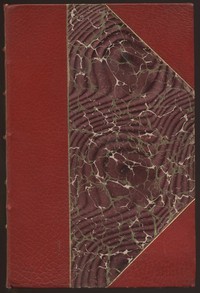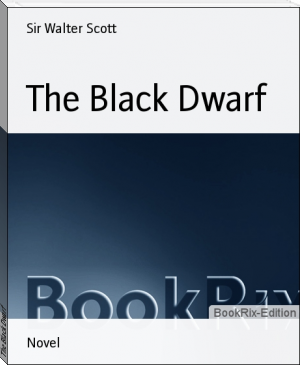Old Mortality, Volume 2. by Walter Scott (most important books to read txt) 📗

- Author: Walter Scott
Book online «Old Mortality, Volume 2. by Walter Scott (most important books to read txt) 📗». Author Walter Scott
The command was so unexpectedly given, and so suddenly executed by those of the party who had gradually closed behind and around Morton, that he was overpowered, disarmed, and a horse-girth passed round his arms, before he could offer any effectual resistance. When this was accomplished, a dead and stern silence took place. The fanatics ranged themselves around a large oaken table, placing Morton amongst them bound and helpless, in such a manner as to be opposite to the clock which was to strike his knell. Food was placed before them, of which they offered their intended victim a share; but, it will readily be believed, he had little appetite. When this was removed, the party resumed their devotions. Macbriar, whose fierce zeal did not perhaps exclude some feelings of doubt and compunction, began to expostulate in prayer, as if to wring from the Deity a signal that the bloody sacrifice they proposed was an acceptable service. The eyes and ears of his hearers were anxiously strained, as if to gain some sight or sound which might be converted or wrested into a type of approbation, and ever and anon dark looks were turned on the dial-plate of the time-piece, to watch its progress towards the moment of execution.
Morton's eye frequently took the same course, with the sad reflection, that there appeared no posibility of his life being expanded beyond the narrow segment which the index had yet to travel on the circle until it arrived at the fatal hour. Faith in his religion, with a constant unyielding principle of honour, and the sense of conscious innocence, enabled him to pass through this dreadful interval with less agitation than he himself could have expected, had the situation been prophesied to him. Yet there was a want of that eager and animating sense of right which supported him in similar circumstances, when in the power of Claverhouse. Then he was conscious, that, amid the spectators, were many who were lamenting his condition, and some who applauded his conduct. But now, among these pale-eyed and ferocious zealots, whose hardened brows were soon to be bent, not merely with indifference, but with triumph, upon his execution,—without a friend to speak a kindly word, or give a look either of sympathy or encouragement,—awaiting till the sword destined to slay him crept out of the scabbard gradually, and as it were by strawbreadths, and condemned to drink the bitterness of death drop by drop,—it is no wonder that his feelings were less composed than they had been on any former occasion of danger. His destined executioners, as he gazed around them, seemed to alter their forms and features, like spectres in a feverish dream; their figures became larger, and their faces more disturbed; and, as an excited imagination predominated over the realities which his eyes received, he could have thought himself surrounded rather by a band of demons than of human beings; the walls seemed to drop with blood, and the light tick of the clock thrilled on his ear with such loud, painful distinctness, as if each sound were the prick of a bodkin inflicted on the naked nerve of the organ.
It was with pain that he felt his mind wavering, while on the brink between this and the future world. He made a strong effort to compose himself to devotional exercises, and unequal, during that fearful strife of nature, to arrange his own thoughts into suitable expressions, he had, instinctively, recourse to the petition for deliverance and for composure of spirit which is to be found in the Book of Common Prayer of the Church of England. Macbriar, whose family were of that persuasion, instantly recognised the words, which the unfortunate prisoner pronounced half aloud.
"There lacked but this," he said, his pale cheek kindling with resentment, "to root out my carnal reluctance to see his blood spilt. He is a prelatist, who has sought the camp under the disguise of an Erastian, and all, and more than all, that has been said of him must needs be verity. His blood be on his head, the deceiver!—let him go down to Tophet, with the ill-mumbled mass which he calls a prayer-book, in his right hand!"
"I take up my song against him!" exclaimed the maniac. "As the sun went back on the dial ten degrees for intimating the recovery of holy Hezekiah, so shall it now go forward, that the wicked may be taken away from among the people, and the Covenant established in its purity."
He sprang to a chair with an attitude of frenzy, in order to anticipate the fatal moment by putting the index forward; and several of the party began to make ready their slaughter-weapons for immediate execution, when Mucklewrath's hand was arrested by one of his companions.
"Hist!" he said—"I hear a distant noise."
"It is the rushing of the brook over the pebbles," said one.
"It is the sough of the wind among the bracken," said another.
"It is the galloping of horse," said Morton to himself, his sense of hearing rendered acute by the dreadful situation in which he stood; "God grant they may come as my deliverers!"
The noise approached rapidly, and became more and more distinct.
"It is horse," cried Macbriar. "Look out and descry who they are."
"The enemy are upon us!" cried one who had opened the window, in obedience to his order.
A thick trampling and loud voices were heard immediately round the house. Some rose to resist, and some to escape; the doors and windows were forced at once, and the red coats of the troopers appeared in the apartment.
"Have at the bloody rebels!—Remember Cornet Grahame!" was shouted on every side.
The lights were struck down, but the dubious glare of the fire enabled them to continue the fray. Several pistol-shots were fired; the whig who stood next to Morton received a shot as he was rising, stumbled against the prisoner, whom he bore down with his weight, and lay stretched above him a dying man. This accident probably saved Morton from the damage he might otherwise have received in so close a struggle, where fire-arms were discharged and sword-blows given for upwards of five minutes.
"Is the prisoner safe?" exclaimed the well-known voice of Claverhouse; "look about for him, and dispatch the whig dog who is groaning there."
Both orders were executed. The groans of the wounded man were silenced by a thrust with a rapier, and Morton, disencumbered of his weight, was speedily raised and in the arms of the faithful Cuddie, who blubbered for joy when he found that the blood with which his master was covered had not flowed from his own veins. A whisper in Morton's ear, while his trusty follower relieved him from his bonds, explained the secret of the very timely appearance of the soldiers.
"I fell into Claverhouse's party when I was seeking for some o' our ain folk to help ye out o' the hands of the whigs, sae being atween the deil and the deep sea, I e'en thought it best to bring him on wi' me, for he'll be wearied wi' felling folk the night, and the morn's a new day, and Lord Evandale awes ye a day in ha'arst; and Monmouth gies quarter, the dragoons tell me, for the asking. Sae haud up your heart, an' I'se warrant we'll do a' weel eneugh yet." [Note: NOTE TO CHAPTER XII. The principal incident of the foregoing Chapter was suggested by an occurrence of a similar kind, told me by a gentleman, now deceased, who held an important situation in the Excise, to which he had been raised by active and resolute exertions in an inferior department. When employed as a supervisor on the coast of Galloway, at a time when the immunities of the Isle of Man rendered smuggling almost universal in that district, this gentleman had the fortune to offend highly several of the leaders in the contraband trade, by his zeal in serving the revenue. This rendered his situation a dangerous one, and, on more than one occasion, placed his life in jeopardy. At one time in particular, as he was riding after sunset on a summer evening, he came suddenly upon a gang of the most desperate smugglers in that part of the country. They surrounded him, without violence, but in such a manner as to show that it would be resorted to if he offered resistance, and gave him to understand he must spend the evening with them, since they had met so happily. The officer did not attempt opposition, but only asked leave to send a country lad to tell his wife and family that he should be detained later than he expected. As he had to charge the boy with this message in the presence of the smugglers, he could found no hope of deliverance from it, save what might arise from the sharpness of the lad's observation, and the natural anxiety and affection of his wife. But if his errand should be delivered and received literally, as he was conscious the smugglers expected, it was likely that it might, by suspending alarm about his absence from home, postpone all search after him till it might be useless. Making a merit of necessity, therefore, he instructed and dispatched his messenger,




Comments (0)